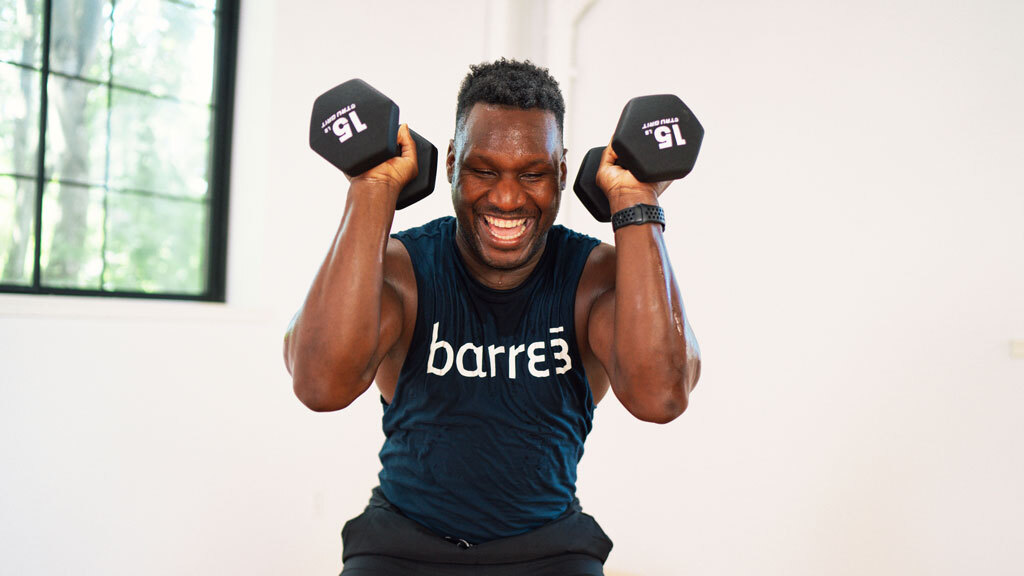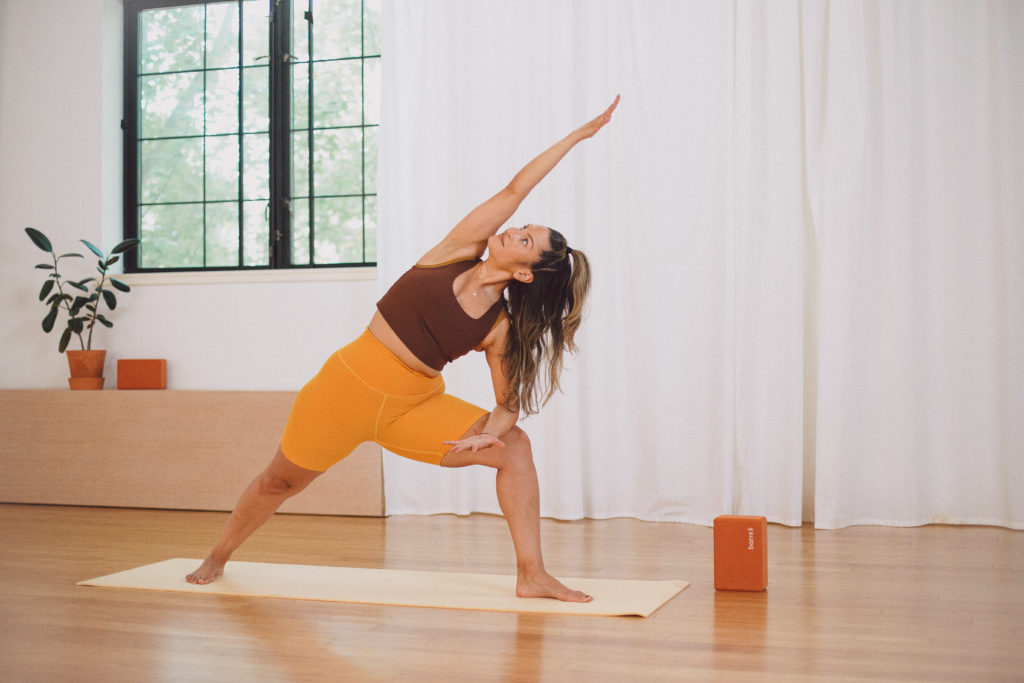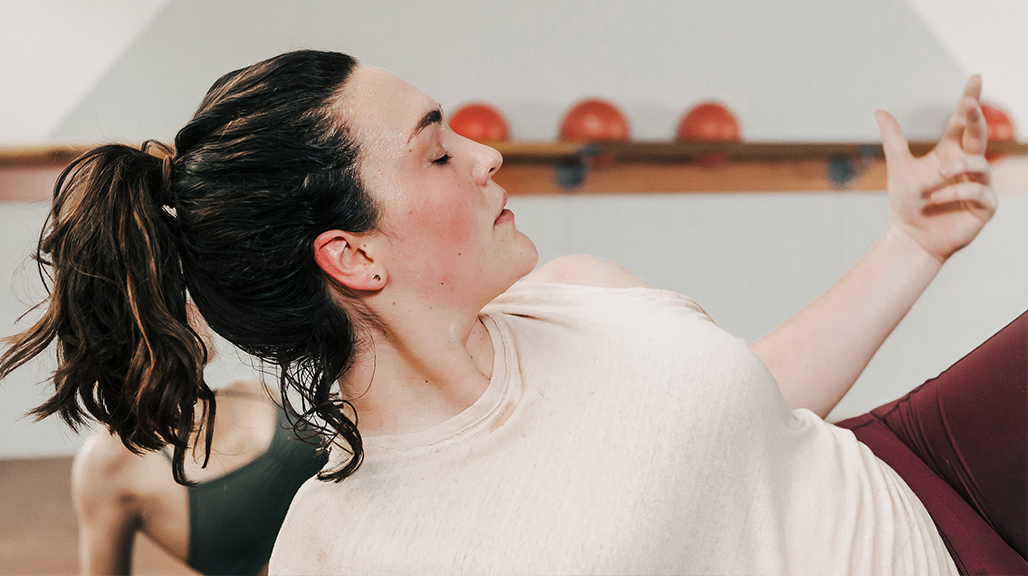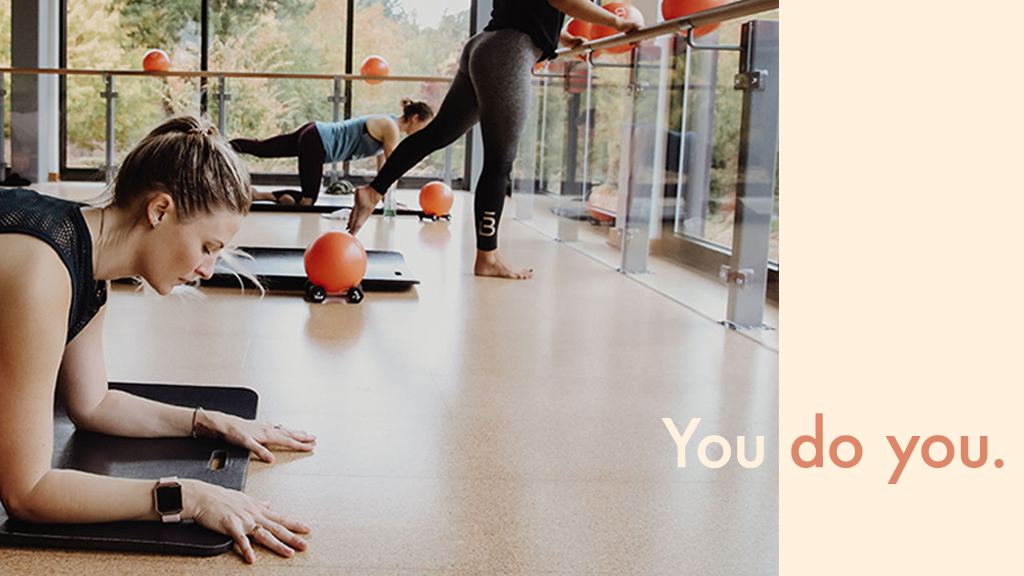Connect
Instructor Spotlight: Ace
Beaming smile, boundless energy, motivation for days—if you’ve done one of Ace’s online workouts, you’ve experienced the magic. We chatted with him to find out where he gets all that energy—and how he manages to convey it through the screen. Read on to learn about how a conversation with his therapist convinced him to try fitness as a career, how a retreat in El Salvador changed his path, and what he hopes everyone feels after a workout with him.
And because we have a feeling you’ll be ready to press play on an Ace workout when you’re finished, you can find all his workouts here. Not a subscriber yet? Subscribe today to get all of Ace’s workouts—and so much more—for free!
B3 MAGAZINE: You’re a personal trainer and a certified yoga teacher, and now you teach online classes for barre3. Clearly, fitness is your thing! How did you first get into the fitness space?
ACE: I got into fitness in general through a therapist. I had gotten out of the military, and it wasn’t going so great for me. I had a lot of struggles with anger, a lot of struggles with where I was supposed to fit after the military. I was at a job that I really really hated, and one day my therapist asked, what do you like to do? And I said, “I like to work out.” And she asked if I’d ever considered being a personal trainer. I told her I had, but I explained that it doesn’t pay that well, that I didn’t know too many people who make a decent living doing it, and that I wasn’t sure it would work for me. She was like, “Well, why don’t you at least try?”
So I did. I got certified as a personal trainer and got a job at 24-hour fitness. I was working both as a personal trainer and teaching a boot-camp type of class on the weekends. But it was hard—I had a full-time job at the time, so I could only work between the hours of 5pm and 8pm, plus weekends.
Then a friend of mine ran into someone who worked for Orange Theory and suggested that I try that. I applied, and I’ve been working for them for the past five years.
B3 MAGAZINE: Did you feel satisfied once you were working in fitness full time?
ACE: Yes, but, after a while, the anger I had experienced before started to seep back in, and I knew I needed something else. I learned about this retreat in El Salvador, and I was like, “I’ve got to go there.” So I signed up.
When I got there, the whole group was together, and we did this activity where they asked the standard question to everyone: “Why are you here?” And I gave a kind of false answer, something like “I’m just here to meet new people.”
By day three my roommate said to me, “I don’t understand why you’re here.” I asked him what he meant, and he said, “You don’t seem like you like it. You don’t seem like you want to do any of it. It doesn’t make sense why you’d pay all this money and not immerse yourself into what’s going on.”
And I was like, interesting…. And so the next day, I decided to dive into this and see what happened.
B3 MAGAZINE: How did that go?
ACE: We did this sound bath—I had never done one before. We were by the ocean, so you had the waves rushing up against the beach, and they had this song playing. And for some reason I just started bawling. Full tears, full crying. I think for the rest of the retreat I cried every single day. I was like, “What. Is. HAPPENING. to me right now? I’m going with it, but I don’t understand.”
I think it was the first time I had tapped into that part of me. I think the wording was right, the feeling was right, and I was in the space to receive those words. From that point on in the retreat, every exercise had these poignant meanings for me.
B3 MAGAZINE: That sounds like a major turning point. Did it change how you lived your life afterward?
ACE: Definitely. When I got back, I decided to go get certified to teach yoga because I wanted everyone to have that same feeling that I’d just had. I wanted everyone to be able to come into a space, feel so comfortable in that space that they’re able to just let go, and walk out of there with a little epiphany or aha moment, or just feel good in general about themselves.
B3 MAGAZINE: Did you find that teaching yoga gave you what you wanted?
ACE: Nope, I did not. I started working at a studio, and it was very different. This studio specifically wanted yoga to be more of a workout than a soul-bearing, spiritual connection kind of exercise. Yoga isn’t easy to teach. It’s about learning sequences, learning how to tell people how to move their body, explaining things so someone can understand what they’re supposed to do when their eyes are closed. That first year and a half, it was me learning how I wanted to speak.
B3 MAGAZINE: Were you teaching other workouts at the same time?
ACE: I kind of just started teaching anything and everything. After yoga, I dived into spin, and that was a whole other beast. It’s a different voice—more aggressive, different choreography.
B3 MAGAZINE: And how did you get to barre3?
ACE: Alex [Executive Producer at barre3] used to come to my yoga class, and one day she asked me if I’d try teaching for barre3. I had taken one barre3 class before—a “friends and family” class led by a coworker at Orange Theory who was training to teach barre3. It was miserable. I think it was the tiny movements that took me out. Those little pulses, the holds, moving to the rhythm while making sure your form is right, listening to the cues, holding onto the ball, holding onto the weights. I swore I would never do it again! Afterward, I told my friend, “Thank you for the class, but I am never coming back.”
B3 : Wow! Did you feel like it was a good workout, or were you thinking “it’s not for me.”
ACE: Both! I was like, this is an extremely good workout, but I had that thing where because I didn’t master it the first time, I decided it wasn’t for me.
But Alex told me barre3 wanted me to teach a strength-training class, not a traditional barre3 class, so I was like, “Oh! Sign me up.” And then after my first filming, Alex came back and said, “everyone really liked you. Would you be interested in teaching barre3 Signature? She assured me they’d teach me everything I needed to know and walked me through how it would happen, and I was like, “OK, let’s dive in.”
B3 MAGAZINE: She’s convincing!
ACE: Very! So I dived in. I had one-on-ones with Lisa [Schale-Drake, Director of Research and Development at barre3], and she taught me everything—all over Zoom.
B3 MAGAZINE: Did it feel like a steep learning curve?
ACE: Yes, because I had to learn new names for moves, plus the phrasing, how to cue the body, and the order to say it all in. It’s not easy!
B3 MAGAZINE: How did you feel when you filmed your first barre3 class?
ACE: It was a little nerve-wracking. But after my second filming, I watched Dustin film a workout, and the way he was talking, I was like, “Wait, we’re allowed to express ourselves and talk like that?” I didn’t know I could be myself. Now I talk freely and say what I’d normally say if I were working with someone in person.
B3 MAGAZINE: We’ve gotten such amazing feedback about your workouts, largely because your motivational style really comes through. Where do you think that comes from?
ACE: I know this is going to sound so corny, but I say what I want someone to say to me.
B3: I love that!
ACE: When I’m in a class, in order for me to feel comfortable, feel motivated to move, those are the things I need to hear. “Smile,” “This should be fun,” that kind of thing.
B3 MAGAZINE: What do you hope people take away from your workouts?
ACE: I want people, when they finish the class, to feel like I was actually there for them, like I cared about what was happening on their end of the screen—because I do!
Thank you so much, Ace!
Beaming smile, boundless energy, motivation for days—if you’ve done one of Ace’s online workouts, you’ve experienced the magic. We chatted with him to find out where he gets all that energy—and how he manages to convey it through the screen. Read on to learn about how a conversation with his therapist convinced him to try fitness as a career, how a retreat in El Salvador changed his path, and what he hopes everyone feels after a workout with him.
And because we have a feeling you’ll be ready to press play on an Ace workout when you’re finished, you can find all his workouts here. Not a subscriber yet? Subscribe today to get all of Ace’s workouts—and so much more—for free!
B3 MAGAZINE: You’re a personal trainer and a certified yoga teacher, and now you teach online classes for barre3. Clearly, fitness is your thing! How did you first get into the fitness space?
ACE: I got into fitness in general through a therapist. I had gotten out of the military, and it wasn’t going so great for me. I had a lot of struggles with anger, a lot of struggles with where I was supposed to fit after the military. I was at a job that I really really hated, and one day my therapist asked, what do you like to do? And I said, “I like to work out.” And she asked if I’d ever considered being a personal trainer. I told her I had, but I explained that it doesn’t pay that well, that I didn’t know too many people who make a decent living doing it, and that I wasn’t sure it would work for me. She was like, “Well, why don’t you at least try?”
So I did. I got certified as a personal trainer and got a job at 24-hour fitness. I was working both as a personal trainer and teaching a boot-camp type of class on the weekends. But it was hard—I had a full-time job at the time, so I could only work between the hours of 5pm and 8pm, plus weekends.
Then a friend of mine ran into someone who worked for Orange Theory and suggested that I try that. I applied, and I’ve been working for them for the past five years.
B3 MAGAZINE: Did you feel satisfied once you were working in fitness full time?
ACE: Yes, but, after a while, the anger I had experienced before started to seep back in, and I knew I needed something else. I learned about this retreat in El Salvador, and I was like, “I’ve got to go there.” So I signed up.
When I got there, the whole group was together, and we did this activity where they asked the standard question to everyone: “Why are you here?” And I gave a kind of false answer, something like “I’m just here to meet new people.”
By day three my roommate said to me, “I don’t understand why you’re here.” I asked him what he meant, and he said, “You don’t seem like you like it. You don’t seem like you want to do any of it. It doesn’t make sense why you’d pay all this money and not immerse yourself into what’s going on.”
And I was like, interesting…. And so the next day, I decided to dive into this and see what happened.
B3 MAGAZINE: How did that go?
ACE: We did this sound bath—I had never done one before. We were by the ocean, so you had the waves rushing up against the beach, and they had this song playing. And for some reason I just started bawling. Full tears, full crying. I think for the rest of the retreat I cried every single day. I was like, “What. Is. HAPPENING. to me right now? I’m going with it, but I don’t understand.”
I think it was the first time I had tapped into that part of me. I think the wording was right, the feeling was right, and I was in the space to receive those words. From that point on in the retreat, every exercise had these poignant meanings for me.
B3 MAGAZINE: That sounds like a major turning point. Did it change how you lived your life afterward?
ACE: Definitely. When I got back, I decided to go get certified to teach yoga because I wanted everyone to have that same feeling that I’d just had. I wanted everyone to be able to come into a space, feel so comfortable in that space that they’re able to just let go, and walk out of there with a little epiphany or aha moment, or just feel good in general about themselves.
B3 MAGAZINE: Did you find that teaching yoga gave you what you wanted?
ACE: Nope, I did not. I started working at a studio, and it was very different. This studio specifically wanted yoga to be more of a workout than a soul-bearing, spiritual connection kind of exercise. Yoga isn’t easy to teach. It’s about learning sequences, learning how to tell people how to move their body, explaining things so someone can understand what they’re supposed to do when their eyes are closed. That first year and a half, it was me learning how I wanted to speak.
B3 MAGAZINE: Were you teaching other workouts at the same time?
ACE: I kind of just started teaching anything and everything. After yoga, I dived into spin, and that was a whole other beast. It’s a different voice—more aggressive, different choreography.
B3 MAGAZINE: And how did you get to barre3?
ACE: Alex [Executive Producer at barre3] used to come to my yoga class, and one day she asked me if I’d try teaching for barre3. I had taken one barre3 class before—a “friends and family” class led by a coworker at Orange Theory who was training to teach barre3. It was miserable. I think it was the tiny movements that took me out. Those little pulses, the holds, moving to the rhythm while making sure your form is right, listening to the cues, holding onto the ball, holding onto the weights. I swore I would never do it again! Afterward, I told my friend, “Thank you for the class, but I am never coming back.”
B3 : Wow! Did you feel like it was a good workout, or were you thinking “it’s not for me.”
ACE: Both! I was like, this is an extremely good workout, but I had that thing where because I didn’t master it the first time, I decided it wasn’t for me.
But Alex told me barre3 wanted me to teach a strength-training class, not a traditional barre3 class, so I was like, “Oh! Sign me up.” And then after my first filming, Alex came back and said, “everyone really liked you. Would you be interested in teaching barre3 Signature? She assured me they’d teach me everything I needed to know and walked me through how it would happen, and I was like, “OK, let’s dive in.”
B3 MAGAZINE: She’s convincing!
ACE: Very! So I dived in. I had one-on-ones with Lisa [Schale-Drake, Director of Research and Development at barre3], and she taught me everything—all over Zoom.
B3 MAGAZINE: Did it feel like a steep learning curve?
ACE: Yes, because I had to learn new names for moves, plus the phrasing, how to cue the body, and the order to say it all in. It’s not easy!
B3 MAGAZINE: How did you feel when you filmed your first barre3 class?
ACE: It was a little nerve-wracking. But after my second filming, I watched Dustin film a workout, and the way he was talking, I was like, “Wait, we’re allowed to express ourselves and talk like that?” I didn’t know I could be myself. Now I talk freely and say what I’d normally say if I were working with someone in person.
B3 MAGAZINE: We’ve gotten such amazing feedback about your workouts, largely because your motivational style really comes through. Where do you think that comes from?
ACE: I know this is going to sound so corny, but I say what I want someone to say to me.
B3: I love that!
ACE: When I’m in a class, in order for me to feel comfortable, feel motivated to move, those are the things I need to hear. “Smile,” “This should be fun,” that kind of thing.
B3 MAGAZINE: What do you hope people take away from your workouts?
ACE: I want people, when they finish the class, to feel like I was actually there for them, like I cared about what was happening on their end of the screen—because I do!
Thank you so much, Ace!










0 people have left a comment. Join the conversation!
View Comments